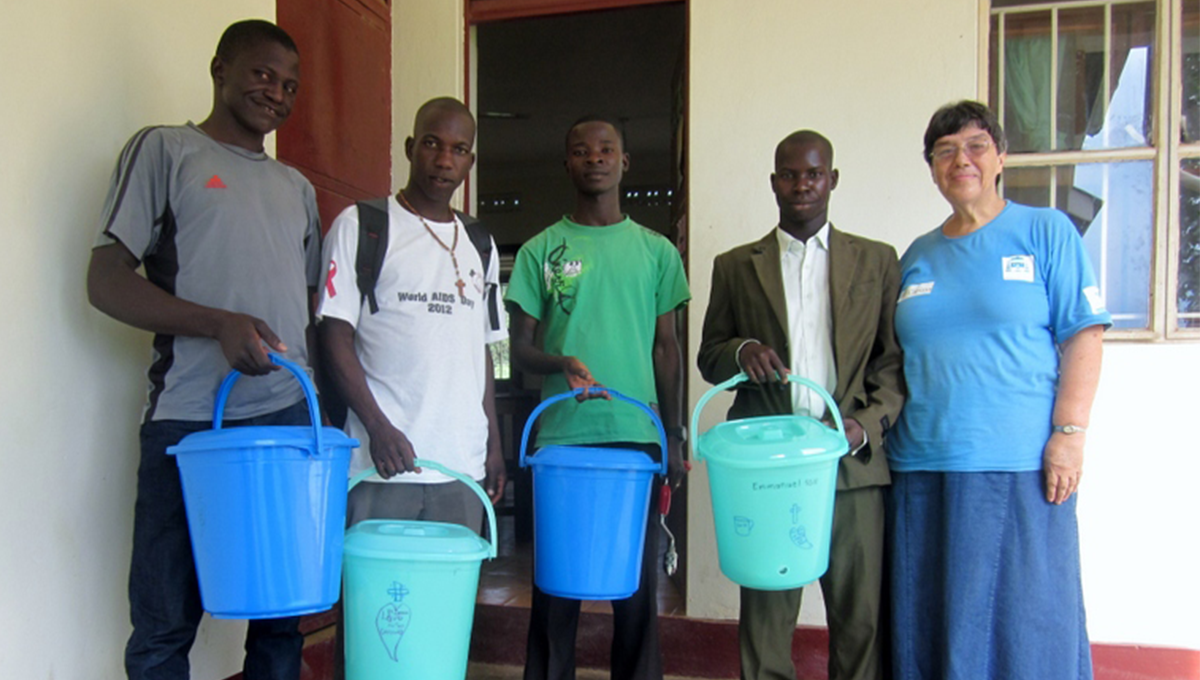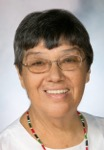
Sister Pat Johannsen had a birds-eye view of South Sudanese independence—and the start of the civil war. Guest: Sister Pat Johannsen.
This Random Nun Clip is brought to you by one of our wonderful sponsors, the Sisters of the Holy Cross.
Don’t forget to call us and leave a message. Tell us what you like, ask a question, or just say hi. Call 913-214-6087.
Let us know your thoughts about the podcast by taking this short survey! Your input helps us shape the future of our podcasts! Click HERE to take the survey. Thank you!
Sister Patricia Johannsen, SCL, grew up on a farm in Montana, and answered God's call to religious life by  joining the Sisters of Charity of Leavenworth in faraway Kansas. She spent over four years in South Sudan, training teachers as part of the Solidarity with South Sudan ministry. She currently serves at the Interfaith Community of Hope, a homeless shelter in Leavenworth.
joining the Sisters of Charity of Leavenworth in faraway Kansas. She spent over four years in South Sudan, training teachers as part of the Solidarity with South Sudan ministry. She currently serves at the Interfaith Community of Hope, a homeless shelter in Leavenworth.
This Random Nun Clip is brought to you by A Nun's Life Ministry. My guest today is Sister Patricia Johannsen, a Sister of Charity of Leavenworth. Sister Pat grew up on a farm in Montana, and answered God's call to religious life by joining a congregation in faraway Kansas. She spent over four years in South Sudan, training teachers as part of the Solidarity with South Sudan ministry
Sister Rejane
When you said it was dangerous--I remember earlier you said, you know, trying to be an example of people of different tribes living together in harmony, was there political unrest that had been going on?
Sister Pat
You know, when I came in April, they were getting ready for independence, because they had voted for independence, and they were going to become independent in July. I never remember if it's the eighth or the tenth. I think it's the tenth is their independence day, and I was there for independence, and it was wonderful. And independence worked and held for two years. And in 2013--
Sister Rejane
I'm going to interrupt: independence of South Sudan from Sudan--correct?
Sister Pat
From Sudan. Yes. And it held for for two years. In 2013, there was a supposed coup between Riek Machar and Salva Kiir, who was the president and Riek was the vice president. And that started factions fighting. And, you know, the soldiers weren't paid, and so they tried to get money, however they could. And so a lot of times they they'd stop cars on the road and kind of demand money and stuff. And after 2013 we did not drive to Juba anymore, because it was basically too dangerous. There were just too many, you know, and some of them were the soldiers. Some of them were just factions of kind of hoodlums. And so yeah, we didn't. Now we we drove to and from Romainsay, we drove to Yambio to Tumbura. We drove other places for a while within Western Equatoria. But it just became more and more dangerous to be on the roads. So that was just kind of a part of life there. The peace is somewhat better now. but not completely.
Sister Rejane
When you talk about, you know, the President and the Vice President and factions, are these kind of composed of different tribes? Are there a lot of different tribes in South Sudan?
Sister Pat
You know, there are there are many, many tribes. The two biggest and most powerful are the Dinkas, and Salva Kiir is Dinka. And then the other big, powerful tribe are the Nuers, and Riek Machar was a Nuer. And basically, those men were high up soldiers during the war. And they're warlords. You know, the different tribes have always been in conflict. And, you know, I think at first--well, for a long time, they would they would be in conflict when they needed something, you know, they'll steal people's cattle and that kind of thing. It's kind of reminiscent of, kind of how the tribes were--the Native American tribes were in the United States. But they were set against one another, you know. It was to the British benefit to have those tribes fighting against one another. And to some degree, the fight for independence united them. But after independence, they had nobody to fight against and stuff. So then they started fighting against one another. And so I would say that that's kind of how it is. Who knows if they'll ever come to--I think they will. I think they will eventually, because a lot of peace work has been done. Some of that peace work was instigated by Solidarity with South Sudan. I think the women of South Sudan will be the ones who finally bring peace. They are more invested than the men.




